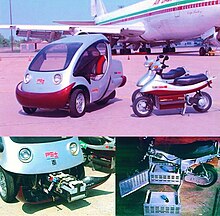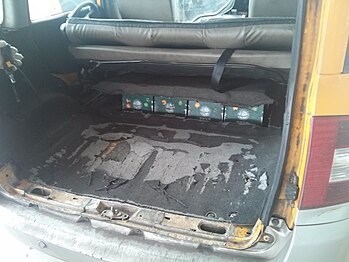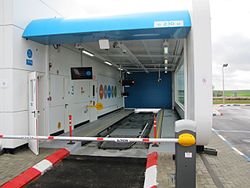
Battery swapping or battery switching is an electric vehicle technology that allows battery electric vehicles to quickly exchange a discharged battery pack for a fully charged one, rather than to recharge the vehicle via a charging station. Battery swapping is common in electric forklift applications.
As of 2021, Taiwanese electric scooter manufacturer Gogoro operates the largest battery swap network for electric mopeds, with nearly 11,000 GoStations in Taiwan, and 250 in Mainland China. Chinese luxury carmaker Nio is the only major operator of automobile battery swapping stations for the public. The company has built around 2250 battery swap stations around China and Europe, and the process takes three minutes from start to finish. Previously, Renault and Tesla attempted to make their vehicles capable of swapping batteries.
History

The concept of an exchangeable battery service was proposed as early as 1896. It was first offered between 1910 and 1924, by Hartford Electric Light Company, through the GeVeCo battery service, serving electric trucks. The vehicle owner purchased the vehicle, without a battery, from General Vehicle Company (GeVeCo), part-owned by General Electric. The power was purchased from Hartford Electric in the form of an exchangeable battery. The vehicles and batteries were designed to facilitate a fast exchange. The owner paid a variable per-mile charge and a monthly service fee to cover truck maintenance and storage. These vehicles covered more than 6 million miles.
Beginning in 1917 and lasting a few years, a similar service operated in Chicago for owners of Milburn Electric cars.
In 1993, Suntera developed a two-seat 3-wheel electric vehicle called the SUNRAY, which came with a battery cartridge that swapped out in minutes at a battery-swap station. In 1995, Suntera added a motor scooter. The company was later renamed Personal Electric Transports(P.E.T.). After 2000 the company developed an electric bus. In 2004, the company's 3-wheel stand-up EV won 1st place at the 5-day long American Tour de Sol electric vehicle race, before closing in 2006.
A rapid battery replacement system was implemented to service 50 electric buses at the 2008 Summer Olympics.
Some smaller schemes have attempted to popularize battery swapping with individual cities. Zotye Auto built a fleet 15 of M300 EV hatchbacks for a taxi fleet in Hangzhou, China. In 2011, one of these vehicles caught on fire after the battery pack in the trunk caught fire. An investigation later found that battery in question, as well as the connecting electronics in the truck, had become worn out from repeated loading and unloading of charged battery packs. The electric scheme was halted following the incident.
-
 A Zotye M300 EV having its batteries replaced.
A Zotye M300 EV having its batteries replaced.
-
 The batteries of a Zotye M300 EV being charged before being swapped.
The batteries of a Zotye M300 EV being charged before being swapped.
-
 Wear and tear in the battery compartment of a Zotye M300 EV, located in the trunk.
Wear and tear in the battery compartment of a Zotye M300 EV, located in the trunk.
The Better Place network was the first modern attempt at making the battery switching model mainstream. The Renault Fluence Z.E. was the first car enabled to adopt the approach and was offered in several countries, including those where no battery swap stations had been planned.

Better Place launched its first battery-swapping station in Israel, in Kiryat Ekron, near Rehovot in March 2011. The exchange process took five minutes. Subsequent battery swap stations were built in Denmark. Better Place filed for bankruptcy in Israel in May 2013.
In 2012, Tesla started building a proprietary fast-charging Tesla Supercharger network. A year later, in June 2013, Tesla announced its plan to offer battery swapping. Tesla showed that a battery swap with the Model S took just over 90 seconds. Elon Musk said the service would be offered at around US$60 to US$80 at June 2013 prices. The vehicle purchase included one battery pack. After a swap, the owner could later return and receive their battery pack fully charged. A second option would be to keep the swapped battery and receive/pay the difference in value between the original and the replacement. Pricing was not announced. In 2015 the company abandoned its sole swapping station, built at Harris Ranch, for lack of customer interest.
Other battery swapping service providers include Gogoro, Delta Electronics, BattSwap,, Voltia, and Swap & Go. By early 2022, Nio had built more than 850 swap stations in China, up from 131 in 2020. A station can cost $772,000 in China. A 90 kWh battery is charged at 60 kW and can be swapped in 6 minutes. China operates cement trucks where the heavy battery is swapped. A battery swap system with a 2 MWh battery in each 20-foot (6.1 m) shipping container powering a converted canal barge began operating in the Netherlands in 2021.
In France, companies like ZEWAY have implemented a battery swapping system for their electric scooters, enabling instant recharging in just 50 seconds through a network of battery swapping stations. This approach is gaining ground, especially in urban areas, as it promotes sustainable transportation while addressing the limitations of traditional battery charging methods. In 2024, ZEWAY reached 1,000,000 swaps and became the European leader in battery swapping.
Gallery
-
 Battery Swap Station for light commercial vehicles in Slovakia.
Battery Swap Station for light commercial vehicles in Slovakia.
-
 Loading a Voltia electric LKW battery pack.
Loading a Voltia electric LKW battery pack.
-
 A shuttered Better Place batter swap station in Funen, Denmark.
A shuttered Better Place batter swap station in Funen, Denmark.
-
 Gogoro GoStation, colocated at a CPC petrol station in Sanzhi District, New Taipei City
Gogoro GoStation, colocated at a CPC petrol station in Sanzhi District, New Taipei City
Criticism
See also: Open hardwareBattery swapping solutions were criticized as proprietary. By creating a monopoly regarding the ownership of the batteries and the patent-protected technologies the companies split up the market and decrease the chances of wider usage of battery swapping.
References
- "Industrial electrical vehicle stalwarts head out on the road". Archived from the original on 16 July 2011. Retrieved 24 October 2010.
- "Swappable batteries for electric vans and lorries make sense". The Economist. ISSN 0013-0613. Retrieved 2022-09-28.
- Shu, Catherine (2021-10-11). "Gogoro launches battery swapping stations in China". TechCrunch. Retrieved 2022-09-28.
- Toll, Micah (2021-08-30). "Gogoro named global leader in light electric vehicle battery swapping, passes 200 million swaps". Electrek. Retrieved 2022-09-28.
- "NIO Power". NIO. Retrieved 4 July 2022.
- "Nio's battery swapping tech in Norway". Deutsche Welle. 8 June 2022. Retrieved 4 July 2022.
- Cassidy, William B. (30 September 2013). "Trucking's Eclipsed Electric Age". The Lost Annals of Transport. Retrieved 20 May 2022.
- Kirsch, David A. (2000). The Electric Vehicle and the Burden of History. Rutgers University Press. pp. 153–162. ISBN 0-8135-2809-7.
- "Technology: Something New Under the Hawaiian Sun: a Solar Car: Japan will import up to 2,000 SunRay zero-emission vehicles. Assembly will take place at a former sugar plantation town". Los Angeles Times. 5 April 1995.
- "Budd Steinhilber, FIDSA". Industrial Designers Society of America - IDSA. 10 May 2010.
- "Honolulu Star-Bulletin Features". archives.starbulletin.com.
- "The Tour de Sol Reports, 2004". autoauditorium.com.
- "BIT Attends the Delivery Ceremony of the 2008 Olympic Games -Alternative Fuel Vehicles". Beijing Institute of Technology. 18 July 2008. Retrieved 2 June 2013.
- "Battery Pack Defects Blamed for Zotye EV Fire". China Auto Web. 2011-06-13. Retrieved 2013-06-25.
- "Better Place. The Renault Fluence ZE". Better Place. 22 October 2010. Archived from the original on 12 September 2010. Retrieved 22 October 2010.
- Udasin, Sharon (24 March 2011). "Better Place launches 1st Israeli battery-switching station". The Jerusalem Post. Retrieved 25 March 2011.
- Motavalli, Jim (29 July 2011). "Plug-and-Play Batteries: Trying Out a Quick-Swap Station for E.V.'s". The New York Times. Retrieved 23 June 2013.
- Kershner, Isabel (26 May 2013). "Israeli Venture Meant to Serve Electric Cars Is Ending Its Run". The New York Times. Retrieved 27 May 2013.
- Elis, Niv (26 May 2013). "Death of Better Place: Electric car co. to dissolve". The Jerusalem Post. Retrieved 30 May 2013.
- "Tesla Motors Launches Revolutionary Supercharger Enabling Convenient Long Distance Driving | Tesla Investor Relations". ir.tesla.com. Sep 24, 2012. Archived from the original on 2020-11-02. Retrieved 2022-06-17.
- ^ Rogowsky, Mark (21 June 2013). "Tesla 90-Second Battery Swap Tech Coming This Year". Forbes. Retrieved 22 June 2013.
- "Tesla Motors demonstrates battery swap in the Model S". Green Car Congress. 21 June 2013. Retrieved 22 June 2013.
- Sorokanich, Robert (10 June 2015). "Musk: Tesla "unlikely" to pursue battery swapping stations". Road & Track. Retrieved 26 October 2015.
- Voltia Group (2 December 2015), Companies successfully using the GreenWay Service, archived from the original on 15 December 2021, retrieved 25 April 2017
- "Electric-Car Battery Swapping, Slovakian Style (Well, Vans, Anyway)". Green Car Reports. Retrieved 25 April 2017.
- Praiwan, Yuthana (5 September 2020). "PTT's head discusses future tactics". Bangkok Post. Retrieved 2022-07-07.
- ^ "Could battery swapping replace EV charging?". Autocar. 4 April 2022. Archived from the original on 4 April 2022. Retrieved 4 April 2022.
- Hanley, Steve (31 May 2020). "NIO Completes More Than 500,000 Battery Swaps". CleanTechnica.
- Doll, Scooter (15 March 2022). "Geely is rolling out swap stations for heavy duty EVs like cement mixers, housing three-ton battery packs". Electrek.
- "First emission-free inland shipping vessel on energy containers in service". Port of Rotterdam. 6 September 2021.
- Berrill, Paul (7 September 2021). "Heineken refreshes the batteries other shippers can't reach". TradeWinds.
- "Tesla battery swap a dead end". 21 June 2013. Retrieved 12 February 2014.